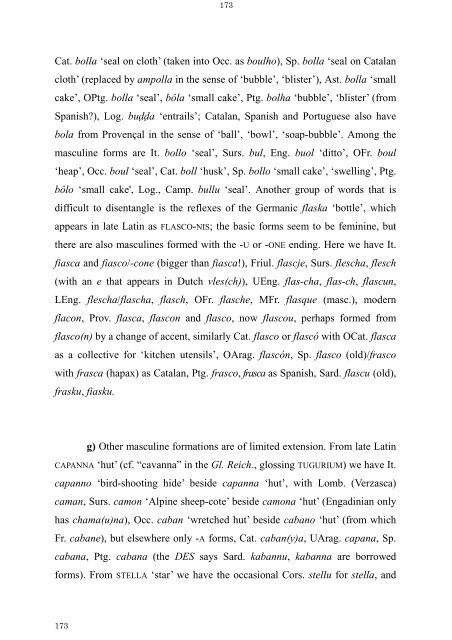The Latin Neuter Plurals in Romance - Page ON
The Latin Neuter Plurals in Romance - Page ON
The Latin Neuter Plurals in Romance - Page ON
You also want an ePaper? Increase the reach of your titles
YUMPU automatically turns print PDFs into web optimized ePapers that Google loves.
173<br />
173<br />
Cat. bolla ‘seal on cloth’ (taken <strong>in</strong>to Occ. as boulho), Sp. bolla ‘seal on Catalan<br />
cloth’ (replaced by ampolla <strong>in</strong> the sense of ‘bubble’, ‘blister’), Ast. bolla ‘small<br />
cake’, OPtg. bolla ‘seal’, bôla ‘small cake’, Ptg. bolha ‘bubble’, ‘blister’ (from<br />
Spanish?), Log. budda ‘entrails’; Catalan, Spanish and Portuguese also have<br />
bola from Provençal <strong>in</strong> the sense of ‘ball’, ‘bowl’, ‘soap-bubble’. Among the<br />
mascul<strong>in</strong>e forms are It. bollo ‘seal’, Surs. bul, Eng. buol ‘ditto’, OFr. boul<br />
‘heap’, Occ. boul ‘seal’, Cat. boll ‘husk’, Sp. bollo ‘small cake’, ‘swell<strong>in</strong>g’, Ptg.<br />
bôlo ‘small cake', Log., Camp. bullu ‘seal’. Another group of words that is<br />
difficult to disentangle is the reflexes of the Germanic flaska ‘bottle’, which<br />
appears <strong>in</strong> late <strong>Lat<strong>in</strong></strong> as FLASCO-NIS; the basic forms seem to be fem<strong>in</strong><strong>in</strong>e, but<br />
there are also mascul<strong>in</strong>es formed with the -U or -<strong>ON</strong>E end<strong>in</strong>g. Here we have It.<br />
fiasca and fiasco/-cone (bigger than fiasca!), Friul. flascje, Surs. flescha, flesch<br />
(with an e that appears <strong>in</strong> Dutch vles(ch)), UEng. flas-cha, flas-ch, flascun,<br />
LEng. flescha/flascha, flasch, OFr. flasche, MFr. flasque (masc.), modern<br />
flacon, Prov. flasca, flascon and flasco, now flascou, perhaps formed from<br />
flasco(n) by a change of accent, similarly Cat. flasco or flascó with OCat. flasca<br />
as a collective for ‘kitchen utensils’, OArag. flascón, Sp. flasco (old)/frasco<br />
with frasca (hapax) as Catalan, Ptg. frasco, frasca as Spanish, Sard. flascu (old),<br />
frasku, fiasku.<br />
g) Other mascul<strong>in</strong>e formations are of limited extension. From late <strong>Lat<strong>in</strong></strong><br />
CAPANNA ‘hut’ (cf. “cavanna” <strong>in</strong> the Gl. Reich., gloss<strong>in</strong>g TUGURIUM) we have It.<br />
capanno ‘bird-shoot<strong>in</strong>g hide’ beside capanna ‘hut’, with Lomb. (Verzasca)<br />
caman, Surs. camon ‘Alp<strong>in</strong>e sheep-cote’ beside camona ‘hut’ (Engad<strong>in</strong>ian only<br />
has chama(u)na), Occ. caban ‘wretched hut’ beside cabano ‘hut’ (from which<br />
Fr. cabane), but elsewhere only -A forms, Cat. caban(y)a, UArag. capana, Sp.<br />
cabana, Ptg. cabana (the DES says Sard. kabannu, kabanna are borrowed<br />
forms). From STELLA ‘star’ we have the occasional Cors. stellu for stella, and









